Symbols of Service: Source Material
Canadian Expeditionary Force
1914-1919
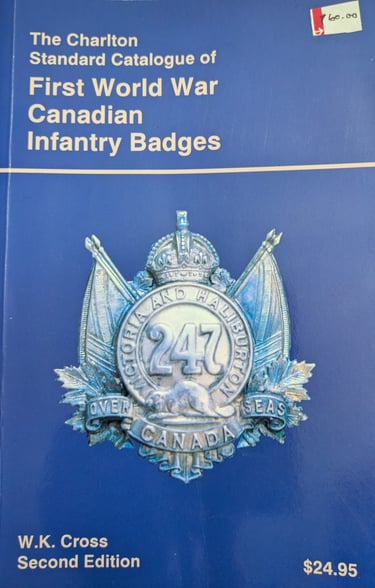

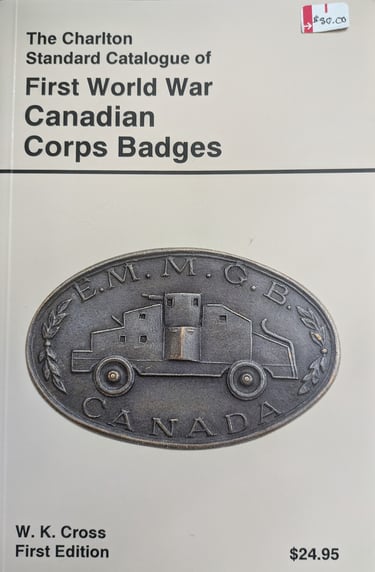

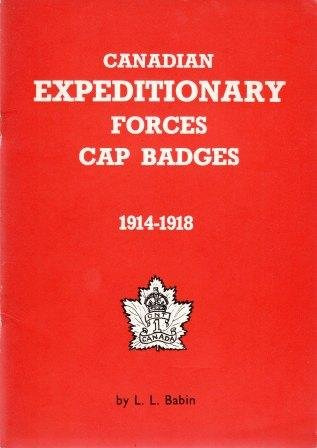

Pre-1920
1920-1953
Buttons
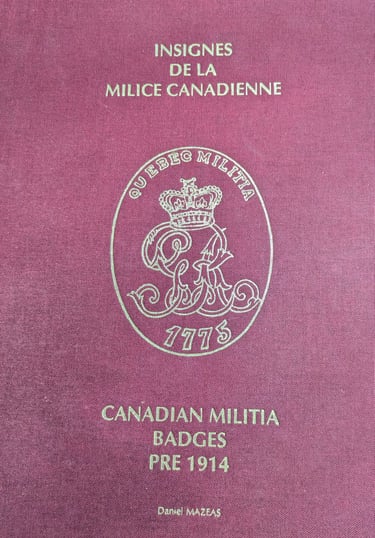

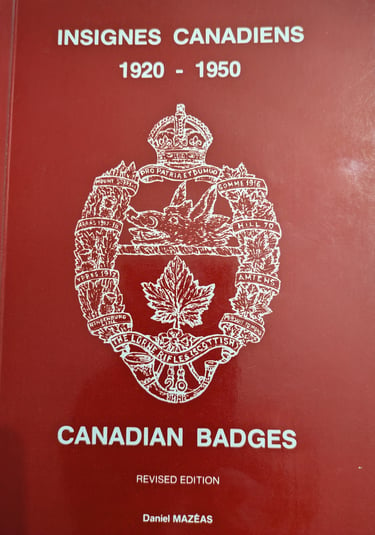

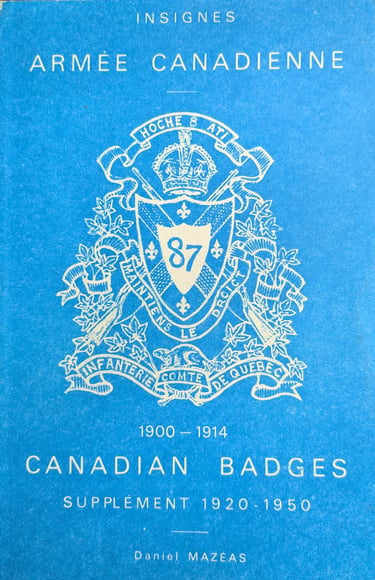

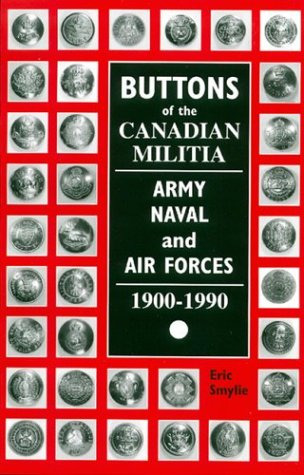

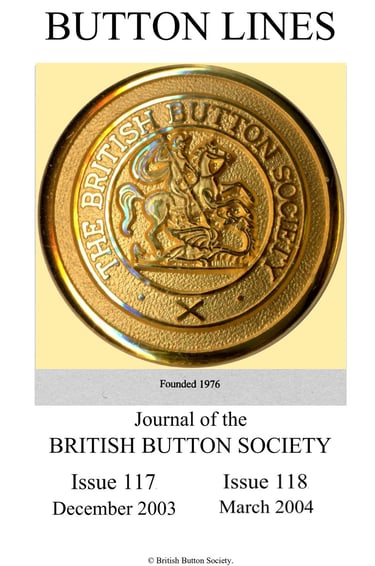

Additional Resources:
The authors are indebted to the collecting community and numerous national, regional, and local museums and wish to extend an invitation to anyone that would like to contribute to the Symbols of Service project. Images of Canadian Military Badges, from any era and condition can be forwarded to our email address: cmc.books.acfw@gmail.com.
Also note in the email if/how you'd like to be cited as a contributor.




Insignia of the Canadian Expeditionary Force
(C.E.F.) 1914-1919 - Volume 1: Infantry Battalions
A brief introduction to the major sections presented in the book is provided below:






Published: Aug 2024
Research Methodology
Badge Characteristics
Infantry Badges
Since 2013 Larry Will, the primary photographer, has accessed private collections, vendors' insignia inventories, museums, and other institutional holdings searching for C.E.F. badges. To make the project manageable, the authors decided that only representative images of unique die strikings would be included; however, not all finishes. Design documents were sourced through the Library and Archives of Canada (L.A.C.) for badge descriptions.
An introduction section for the book presenting various badge design elements that include Methods of Construction, Maker Marks, Badge Metals, Fastening Devices, Finishes, types of Uniform Insignia, Badge Terminology, Buttons, and Button Maker Marks. This section also provides an outline of the CMC Books cataloguing numbering scheme, as tied to the database, and how different variants of military insignia are identified.
High resolution, 1:1 scale, colour images of C.E.F. unit insignia, their variants, and corresponding buttons (if they exist); worn during World War I. Units presented in the book include: C.E.F. General List, P.P.C.L.I., R.C.R., Royal Newfoundland Regiment, 1st to 260th Infantry Battalions, No. 1 Jewish Infantry Company, Yukon Infantry Company, University Overseas Companies, Overseas Infantry Drafts, C.E.F. Reserve Battalions, and North Russia Forces.






Insignia of the C.E.F. 1914-1919
Volume 2: Corps and Services
A brief preview of this Volume's development is provided below:






To be published: 2025 or 2026
Research Methodology
Badge Characteristics
Corp and Service Badges
Continuing the standard set in Vol. 1, private collections, vendors' insignia inventories, museums, and other institutional holdings including the Library and Archives of Canada (L.A.C.) were sourced for badge descriptions and adding to the collection of insignia images.
Similar to the introduction from Vol. 1., the Badge Characteristics section will be updated to reflect Corps and Services badges presented in Vol. 2.
High resolution, 1:1 scale, colour images of C.E.F. unit insignia, their variants, and corresponding buttons (if they exist); worn during World War I. Unit presented in the book include: C.E.F. Artillery, Battalions, Brigades, Corps, Regiments, and Services.
Insignia of the Canadian Militia:
Pre-1920 Badges
A preview of this era's development is presented below:






To be published: 2027 or 2028
Research Methodology
Badge Characteristics
Pre-1920 Badges
Using Daniel Mazéas Pre-1914 book as a starting reference the authors have accessed private collections, vendors' insignia inventories, museums, and other institutional holdings, including Library and Archives of Canada (L.A.C.) for badge descriptions, unit lineages, and additions to the badge image record.
Using the Mazéas numbering scheme as a foundation, Symbols of Service provides updates to help organize badges into sets.
Badges are also presented in three distinct sections: Early Colonial Militia from pre-1855, Boer War: 1899-1902 CSAC Units, and Canadian units and lineages from pre-1920.
Excluding C.E.F. units, this portion of the book presents units from the signing of the British North America Militia Act of 1855 until the formation of the Canadian Department of Militia and Defense, around 1920. Units are organized into: Corps and Services, Cavalry, Infantry, Newfoundland, and Canadian National Youth Program (Cadets).




C.S.A.C. Badges
Pre-1855 Badges
Unit badges presented from before the formation of the Dominion of Canada, and before the signing of the British North America Militia Act of 1855. These include the following historical colonies: Province of Quebec, the Two Canada's: Upper and Lower, the Province of Canada: East and West, and the colonies of Nova Scotia, New Brunswick, P.E.I. and B.C.
11 October 1899 – 31 May 1902: The Second Boer War also known as the Boer War, the Anglo–Boer War, or the South African War, was a conflict fought between the British Empire and two Boer Republics; the South African Republic and the Orange Free State. Dominion of Canada's first major overseas deployment of troops as Canadian South African Contingent (C.S.A.C.).
Insignia of the Canadian Department of Militia and Defense: 1920-1953 Badges
A preview of this era's development is presented below:






To be published: 2029 or 2030
Research Methodology
Badge Characteristics
Canadian Army Badges
Using Daniel Mazéas 1920-1950 and supplement books as a starting reference the authors have accessed private collections, vendors' insignia inventories, museums, and other institutional holdings, including Library and Archives of Canada (L.A.C.) for badge descriptions, unit lineages, and additions to the badge image record.
Symbols of Service will continue the standard set in the previous era, while also providing updates to the Mazéas numbering scheme to help organize badges into sets.
Badges are also presented in three distinct sections: World War II, Canadian Army including Varia, and the introduction of a new element, Canadian Air Force.
Units deployed during WWII without distinct badges will be noted in their badge catalogue. Units and corresponding badges are organized into: Corps and Services, Cavalry, Infantry, Canadian Officers' Training Corps, and Varia.


Canadian Air Force Badges
During and post WWI, Canada attempted to create an Air Force; however, it wasn't until 1924 that a permanent Air Force was fully operational and receive Royal Ascent as the Royal Canadian Air Force. This section of the book will present the various Canadian Air Force badges, as well as those associated with the British Commonwealth Air Training Plan (B.C.A.T.P.).
1 September 1939 – 2 September 1945: World War II, also known as the Second World War, was a global conflict between two coalitions; the Allies and the Axis powers. Canada's field contribution was deployed under Canadian Active Service Force (C.A.S.F.), to differentiate it from "home" units. Units with unique WWII badges may be placed in a separate section.
C.A.S.F. Badges


Insignia of the Canadian Armed Services/Canadian Forces: 1953-2022 Badges
A preview of this era's development is presented below:




To be published: 20xx
Research Methodology
Badge Characteristics
As the most recent "era" there has been few, if any, collectors source material to utilize as a starting point; Symbols of Service Book 5 may become one of the first. The Library and Archives of Canada (L.A.C.) research will be used to identify unit lineages and for trying to categorize the badges into manageable sections.
New uniform accoutrements, i.e. Command Badges, Specialty pins, etc. will be added to the visual record to help collectors catalogue items.
At a minimum, there will be three major eras presented: CAF Pre-Unification, CF Unification, and CAF Post-Unification.
Fabric of War: Canadian Army Cloth Shoulder Insignia c. 1900-1970 by Bill Alexander






Published: 2020
Research Methodology


First review place holder
NAME


★★★★★
CMC Books
Symbols of Service: Definitive reference material for collectors of Canadian Military Insignia.
cONTACT
Order your book here
© 2024. All rights reserved.
